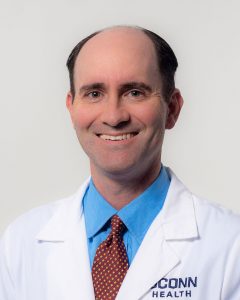Dr. Brian Kelley brings specialized training in neurotrauma and neurocritical care
A neurosurgeon with specialized training is leading a new concussion clinic at UConn Health.
Dr. Brian Kelley, in the roles of neurosurgeon and neurointensivist, seeks to offer an outpatient setting where those who've suffered a traumatic brain injury (TBI) can progress with their recovery following their initial acute care.

"There are ongoing processes inside your head that are not necessarily surgical problems, but still very much contribute to the overall pathology," Kelley says. "There are several aspects related to traumatic brain injury that deal not only with surgical issues, but also with what are called secondary mechanisms of injury. These are processes like hypoxia, free radical formation, or pathologic enzyme activity that happen in a delayed fashion."
Free radicals are unstable molecules that can harm cells. Hypoxia refers to when the body's oxygen levels are low.
Kelley joined UConn Health in 2022, after completing a fellowship in neurocritical care at the University of Pennsylvania that followed his neurosurgical training. In addition to treating brain-injured patients surgically, he's interested in coordinating services to help patients transition into longer-term care needs.
"TBI patients often have long-term neurologic issues, be it cognitive or motor function, and they need resources and a place to go where someone with expertise in the field may not be able to necessarily fix everything but can steer them in the proper direction," Kelley says. "The ultimate goal of the concussion clinic is to integrate neurotrauma care with physical, occupational, and speech therapies, as well as cognitive treatment down the line. That's in addition to dealing with any potential surgical or postoperative issues."
Kelley envisions a comprehensive model for patients to access interdisciplinary care unique to their needs. His concussion clinic opened March 30 at the Brain and Spine Institute at UConn Health, just off its main campus in Farmington at 5 Munson Road.
"The concussion clinic is born out of building an academic practice focused on head trauma," he says. "Post-concussive syndrome can be a little bit of a nebulous diagnosis. Not everybody fits nicely into a box, but if you can drill down on a patient's chief complaint, then at the very least, we can make sure they're seeing the right groups of people."
Of note, Kelley's clinic is separate and distinct from Neurosport, which is part of UConn Health's orthopedics and sports medicine practice and provides comprehensive care for athletes who suffer head injuries.
To start, Kelley expects most of his referrals to come from the UConn John Dempsey Hospital Emergency Department, with an eye toward cultivating the clinic's reputation as a resource for community physicians to send their patients who may be struggling with the aftereffects of brain injury.
"There are patients who suffer what you might think is a fairly innocuous event, but they're left with fairly significant neurologic issues and kind of stuck," he says. "They're not sick enough to be in the hospital, but they can't go back to work or they're not enjoying the quality of life they want. The idea is to perform a neurologic exam, provide them with a head-to-toe assessment of what's going on, and give them the resources to help mitigate some of the ongoing TBI effects."
Dr. Ketan Bulsara, chair of UConn Health's Department of Neurosurgery, says, "Dr. Kelley's training and expertise uniquely position him to provide a great service to help a large group of post-concussive patients. Combined with his research interest in understanding the pathophysiology of brain trauma, he is also uniquely positioned to help advance treatments for this group of patients."






